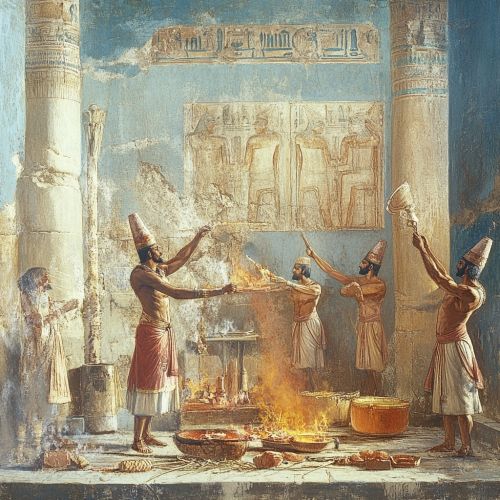Sacrificial Practices
Introduction
Sacrificial practices have been an integral part of human culture and religion since ancient times. These rituals, which often involve offering something valuable to a deity or supernatural force, have varied widely across different civilizations and historical periods. This article delves into the complex and multifaceted nature of sacrificial practices, examining their origins, types, purposes, and the cultural and religious contexts in which they occur.
Historical Origins
The origins of sacrificial practices can be traced back to prehistoric times. Archaeological evidence suggests that early humans engaged in ritualistic offerings to appease gods, spirits, or ancestors. These practices were often linked to Animism, the belief that natural objects, phenomena, and the universe itself possess souls or spirits.
Ancient Civilizations
In ancient civilizations such as Mesopotamia, Egypt, and the Indus Valley, sacrificial practices were deeply embedded in religious and social structures. The Sumerians, for instance, performed sacrifices to honor their pantheon of gods, seeking favor and protection. Similarly, the Ancient Egyptians offered food, animals, and other valuables to their gods, believing that these offerings would ensure the well-being of both the living and the dead.


Types of Sacrifices
Sacrificial practices can be broadly categorized into several types, each serving different purposes and involving various rituals.
Animal Sacrifice
Animal sacrifice is one of the most common forms of sacrificial practices. It involves the ritualistic killing of animals to appease deities or spirits. This practice has been observed in numerous cultures, including the Greeks, Romans, and Aztecs. The type of animal, the method of sacrifice, and the intended purpose can vary significantly. For example, the Greeks often sacrificed bulls during major religious festivals, while the Aztecs performed elaborate rituals involving the sacrifice of birds and other animals.
Human Sacrifice
Human sacrifice, though less common, has been practiced in various cultures throughout history. This form of sacrifice often involved the ritualistic killing of individuals to appease gods, seek divine favor, or ensure the success of important events such as harvests or battles. Notable examples include the Maya and Inca civilizations, where human sacrifices were performed during significant religious ceremonies.
Food and Drink Offerings
Offering food and drink is another prevalent form of sacrifice. These offerings, which can include fruits, grains, wine, and other consumables, are typically made to deities as a gesture of gratitude or supplication. In Hinduism, for instance, food offerings known as Prasada are made to gods during religious ceremonies, with the belief that the deities will bless the offerings and return them to the devotees.
Symbolic Sacrifices
Symbolic sacrifices involve the offering of non-material items or actions that hold significant meaning within a cultural or religious context. These can include acts of penance, fasting, or the dedication of time and effort to a deity. In Christianity, for example, the concept of self-sacrifice is embodied in the figure of Jesus Christ, whose crucifixion is viewed as the ultimate act of sacrifice for the salvation of humanity.
Purposes of Sacrificial Practices
The purposes of sacrificial practices are diverse and multifaceted, often reflecting the complex interplay between religion, culture, and society.
Appeasement and Propitiation
One of the primary purposes of sacrificial practices is to appease or propitiate deities and supernatural forces. By offering sacrifices, individuals and communities seek to gain favor, avert disaster, or ensure divine protection. This belief is evident in many ancient cultures, such as the Babylonians, who performed sacrifices to appease their gods and secure their favor.
Thanksgiving and Gratitude
Sacrificial practices are also used to express gratitude and thanksgiving to deities. Offerings are made to thank the gods for blessings received, such as bountiful harvests, successful hunts, or victories in battle. In Judaism, for example, the Korban Todah is a thanksgiving sacrifice offered to express gratitude for divine intervention or deliverance.
Purification and Atonement
Sacrifices are often performed as acts of purification and atonement, seeking to cleanse individuals or communities of sin, impurity, or misfortune. This purpose is particularly evident in Ancient Israelite religion, where various types of sacrifices, such as the Sin Offering and Guilt Offering, were prescribed to atone for specific transgressions and restore ritual purity.
Social and Political Functions
In addition to their religious significance, sacrificial practices often serve important social and political functions. They can reinforce social hierarchies, establish communal bonds, and legitimize political authority. For instance, in Ancient China, the practice of ancestor worship and sacrificial offerings to deceased rulers played a crucial role in maintaining social order and political stability.
Cultural and Religious Contexts
Sacrificial practices are deeply embedded in the cultural and religious contexts of the societies in which they occur. These contexts shape the nature, significance, and interpretation of sacrificial rituals.
Indigenous Religions
In many indigenous religions, sacrificial practices are integral to the spiritual and cultural life of the community. These practices often involve offerings to ancestors, spirits, and natural forces, reflecting a deep connection to the land and the environment. For example, in African Traditional Religions, sacrifices are made to honor ancestors and seek their guidance and protection.
Major World Religions
Sacrificial practices are also present in major world religions, though their forms and interpretations vary widely.
Hinduism
In Hinduism, sacrificial rituals known as Yajna are performed to honor deities and seek their blessings. These rituals, which can range from simple offerings of ghee and grains to elaborate fire ceremonies, are central to Hindu worship and religious practice.
Buddhism
While Buddhism generally rejects the practice of animal sacrifice, it incorporates symbolic acts of offering and self-sacrifice. For instance, the offering of incense, flowers, and food at Buddhist temples is a common practice, symbolizing devotion and respect to the Buddha and other enlightened beings.
Christianity
In Christianity, the concept of sacrifice is deeply rooted in the belief in Jesus Christ's crucifixion and resurrection. The Eucharist, or Holy Communion, is a sacramental ritual that commemorates Jesus' sacrifice, with bread and wine symbolizing his body and blood.
Islam
In Islam, sacrificial practices are observed during the festival of Eid al-Adha, which commemorates the willingness of Ibrahim (Abraham) to sacrifice his son in obedience to God. During this festival, Muslims perform the ritual of Qurbani, sacrificing animals such as sheep, goats, and cows, and distributing the meat to the needy.
Ethical and Philosophical Considerations
Sacrificial practices raise important ethical and philosophical questions, particularly regarding the morality of taking life and the nature of religious devotion.
Ethical Debates
The practice of animal and human sacrifice has been the subject of ethical debates throughout history. Critics argue that such practices involve unnecessary cruelty and suffering, while proponents contend that they are essential expressions of religious faith and cultural identity. These debates continue to shape contemporary discussions on the ethics of sacrificial rituals.
Symbolism and Meaning
The symbolism and meaning of sacrificial practices are complex and multifaceted. Sacrifices can represent various concepts, such as selflessness, devotion, and the transference of guilt or impurity. Philosophers and theologians have explored these symbolic dimensions, seeking to understand the deeper significance of sacrificial acts.
Modern Perspectives
In contemporary society, sacrificial practices have evolved and adapted to changing cultural and religious contexts. While traditional forms of sacrifice may be less common, symbolic and metaphorical interpretations of sacrifice continue to play a significant role in modern religious and ethical thought.
Secular and Symbolic Sacrifices
In secular contexts, the concept of sacrifice often takes on symbolic meanings. Acts of self-sacrifice, such as dedicating one's time and resources to a cause or making personal sacrifices for the greater good, are valued and celebrated in many cultures. These modern interpretations reflect the enduring significance of sacrificial ideals in human society.
Religious Reinterpretations
Many contemporary religious traditions have reinterpreted sacrificial practices to align with modern ethical and philosophical values. For example, some Hindu communities have replaced animal sacrifices with symbolic offerings of fruits and flowers, emphasizing non-violence and compassion.
Conclusion
Sacrificial practices are a rich and complex aspect of human culture and religion, reflecting the diverse ways in which societies seek to connect with the divine, express gratitude, and navigate ethical and philosophical questions. While the forms and interpretations of sacrifice have evolved over time, the underlying themes of devotion, selflessness, and the search for meaning continue to resonate in contemporary religious and cultural contexts.
